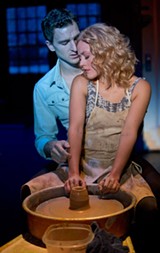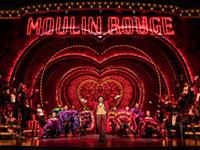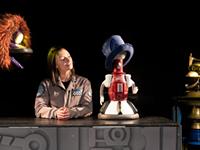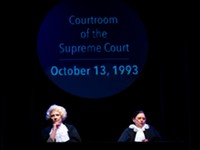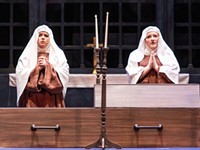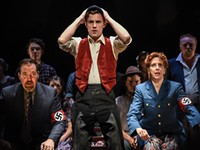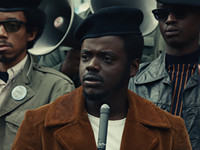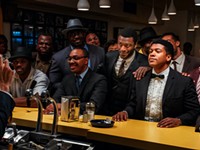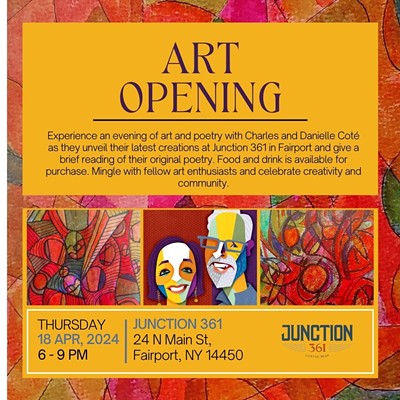[
{
"name": "500x250 Ad",
"insertPoint": "5",
"component": "15667920",
"parentWrapperClass": "",
"requiredCountToDisplay": "1"
}
]
In theory, a musical based on the 1990 film "Ghost" might not seem like such a terrible idea. After 23 years, it remains a popular movie, filled with scenes that have become iconic in the time since its release (it's impossible to hear "Unchained Melody" without it immediately conjuring up images of Patrick Swayze and Demi Moore engaging in some heavy petting around a pottery wheel). Its story is filled with the sort of big emotions and over-the-top sentimentality that would seem to lend themselves to the format of a big-budget musical -- a medium that's all about big emotions. In practice, "Ghost The Musical" turns out to be as misguided a production as I've ever seen.
After a year-long run in London's West End back in 2011, "Ghost The Musical" debuted on Broadway in March of 2012, only to close a short six months later. After such inauspicious beginnings, you'd think the show would be freed to ascend to Broadway heaven, but instead it has been left to wander the country, caught in the limbo of its national tour, like some dancing and singing apparition from the beyond.
The story is exactly the same as the film, focusing on Sam and Molly, an insipidly happy couple prone to making out with each other in front of their friends and talking endlessly about how happy they are together. They do occasionally fight, mostly about how he can't say "I love you," choosing instead to respond with a simple "ditto." He works as an investment banker, meaning that we get a production number featuring black-suited bankers singing about life in the fast lane of New York City, wanting "more and more and more" like they've escaped from a production of "Wall Street: The Musical." She makes pottery, which means she's lucky she has him so they can afford their enormous Brooklyn apartment.
Then Sam and Molly start singing about how they're sure to have "months and weeks and years together," which, of course, is immediately followed by Sam being killed in a seemingly random mugging. His spirit remains earthbound, stuck between worlds, allowing him to stick around long enough to discover that his murder wasn't a random act at all. With Molly in danger, he must find a way to protect his beloved from harm and figure out why he was killed in the first place. The key to his mission turns out to be Oda Mae Brown, a phony storefront psychic who, much to her surprise, turns out not to be such a fraud after all. She's able to hear Sam, and after much convincing, begrudgingly agrees to help him warn Molly.
The basic problem with "Ghost The Musical" is that, while the original film is schmaltzy and manipulative, it was skillfully made. It told a story that took the vast ideas of the supernatural and life after death and applied them to a (relatively) intimate, small-scale story. Translating that to the stage, where everything has to be blown up and made bigger in order to register all the way to the back of the house, renders the story nearly unbearably sappy.
The theatrical adaptation was written by the film's screenwriter,Bruce Joel Rubin, and maybe that's part of the problem. Maybe a writer with more stage experience would have known what changes were necessary to make the transition a success. On top of that, extravagant effects have been ladled on to the production, including a set made up almost entirely of giant sliding LED screens, strobe lights, fog machines, and stage illusions choreographed by professional illusionist Paul Kieve. To be fair, the effects Kieve created are often impressive; the light-up sets, only occasionally so. The sliding screens are used effectively during a fight sequence set aboard a subway car, but most other times they're a distraction, notably with the bizarre decision to show dancing figures that mirror the live dancers onstage. Maybe this was done to make the production numbers seem bigger than they are, but it inadvertently highlights how sloppy the ensemble's dancing tended to be.
Neither Steven Grant Douglas or Katie Postotnik make much of an impression as Sam and Molly, though Postotnik isn't helped by the fact that her character is forced to sing nothing but bland, tuneless ballads. Carla R. Stewart fares better as Oda Mae Brown, but she has the benefit of getting all the best lines and liveliest musical numbers. However, in the most unimaginative choice possible, her character is introduced with gospel number, which is indicative of the show's troubling tendency toward racial caricature. Robby Haltiwanger barely registers as Sam's friend Carl, and (spoiler alert) he's a decidedly nonthreatening presence once he's called upon to play the villain.
I've barely mentioned the music, credited to Dave Stewart, of The Eurythmics (!), and Glen Ballard, and that's because I barely remember any of it. Repeated renditions of "Unchained Melody" only serve to underscore how unmemorable all of the other songs are. The show is a misfire, forgettable nearly top to bottom. At one point, before he dies, Molly tells Sam that he has to "let go of the expected, the traditional, the everyday." Granted, in the context of the scene she's referring to owning a "funky" red refrigerator. But it's advice that the creators of "Ghost The Musical" would have been wise to heed themselves.
